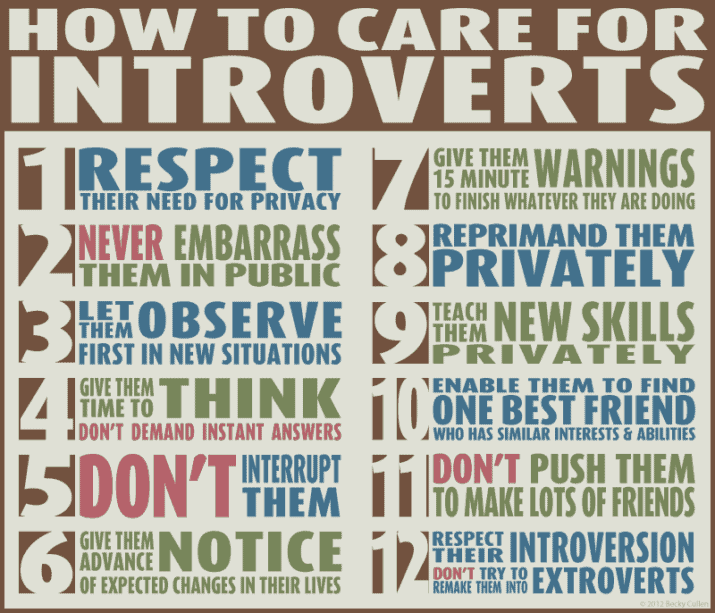In our extraverted society, introverts have it tough.
Misunderstanding of this unique personality type is all too common, often leading to an extremely poor learning experience.
Introverts naturally tend toward territorialism. They’re happy to be alone. Large groups and constant noise can easily drain their energy. They often prefer listening over speaking, and they don’t share private thoughts with just anyone. This can make the traditional school environment a tough one for an introvert to deal with. Even homeschool environments don’t always suit the introverted learning style—after all, they can’t do everything by themselves. Nor should they.
How Can You Know if Your Child is an Introvert?
The simple answer: pay attention. Pay attention to what your child does, how he spends his free time, what he talks about, what he gets excited about, and—most importantly—how he processes information. The only way to understand if your student is introverted is to know how he thinks and processes stimuli. If he seems like a talker to you, that doesn’t necessarily mean he’s extraverted. For instance, what is he talking about? Is he relaying something cool he learned on his own time, or is he using that conversation to piece together his findings and assemble them into an understandable whole?
Society
Unfortunately, western society often favors the extravert. As the industrialization movement of the late 1700’s took off, the west had to come up with an organized way to cope with education, shift management, and day-to-day social processes. We began working to the clock rather than the sun, and our view of work was changed to support a “team effort,” rather than the previous individualistic approach.
In the education revolution, which happened around the same time, we needed a standard way to deliver information and assess student progress. Since more and more children were publicly educated, class sizes also grew. This naturally assisted in the “social” orientation: increasing stimulus, and viewing the more vocal, outgoing, and “stand-outish” kids as the most successful. But as you already know, this one-size-fits-all mentality just doesn’t work. Even worse, this mentality often portrays introverts as the “outcasts.” They’re the quiet ones who talk differently, think differently, enjoy different activities, and just don’t fit in. This mentality opens the floodgates for judgement and ridicule, causing many introverts to simply shut down.
How to Teach Your Introvert
Avoid the Word “Normal” We as humans enjoy creating definitions and boxes to help us better understand the phenomena of our daily lives. Knowing a person fits into a standard “type” helps us wrap our minds around the broad category of this person. One of the types we’ve created is called “normal.” As we mentioned before, society has been engineered to favor the extraverted student. Young children must adhere to this warped sense of normal lest they risk being called “different,” “weird,” or, heaven forbid, “sick.” However, people never fit squarely into boxes. Students vary greatly based on their personality, interests, natural ability, etc.
Practical Tips:
Forget schoolrooms
You’re homeschooling for a reason. I know families who work best on a rigid schedule with desks, class times, and homework due dates. But for the majority of homeschool families, the “school time” tactic just doesn’t work. Forget the school room. Forget the “teaching time.” Allow your student to explore curriculum on their own, work through the homework you give them, and come to you to learn things as they need it.
Chuck the one-size-fits-all curricula
Introverts work for internal rewards more than external ones. So you want to foster that love as much as possible. Find what they think is interesting and hone that interest. Allow them to spend more time on the subjects they love and foster interest in the “boring” subjects by helping them apply that learning to their lives. This will aid in cultivating an innate love of learning which will last far beyond their school days.
Use effort-based accomplishment
Especially when it comes to grading more nebulis activities like writing, it’s important to provide your child with a basic rubric (expected learning outcomes), and grade them based upon that. There are two grades when using this system: A for Acceptable, and N for Not Complete. If your student is not understanding and practicing the learning outcomes you’ve defined in your rubric, send their work back for a second try. If you want further teaching on effort-based grades, I would recommend Andrew Pudewa’s free ebook, Marking and Grading.
Give Your Introvert Space
Introverts are a particularly private bunch. Having someone hover over their shoulder and watch everything they do or providing constant stimulation can quickly become overwhelming, resulting in poor performance and a loss of valuable learning.
Practical Tips:
Give your student deadlines
This is a great way to prepare your student for inevitable expectations enforced by employers, managers, and the world in general. Don’t hover or nag, instead give your student deadlines and maybe a little guidance, but then allow them the freedom to accomplish tasks his way. Build quiet time into every school day Even when not working on a particular project, your introvert needs plenty of time to himself to think and reflect on the stimulation around him. Building quiet time into their day will allow your student to recharge their batteries and keep himself mentally healthy.
Try a flipped classroom
Don’t demand instant answers. Allow your student to chew on a problem or work it out on their own before coming back to you with an answer. Once they prepare their thoughts beforehand, a small-scale group discussion can help them learn new ideas and new ways of thinking. An especially helpful technique when applied to homeschool groups, this can help your introvert feel like “part of the group” without fear of failure or rejection.
Help Your Introvert Socialize
It’s worth mentioning that while introverts definitely have a unique way of interacting with the rest of the world, they still need to interact with the rest of the world! One of the first things God said after creating man was “it is not good for man to be alone” (Gen. 2:18). He Himself desires, above all else, to have relationship with His creation! Who are we to say we can ignore the very thing God created us for?
Practical Tips:
Give him a gentle push
A little socialization can be good for an introvert, even if it comes with resistance. I’m not advising you force your introvert to behave like an extravert, but the fact of the matter is kids (especially young kids) don’t often know what they need. But you do. Start a homeschool co-op, get them involved in a team, or just organize a sleepover with their best friend. Your student doesn’t need a full social calendar every day, but she does need interaction. Don’t be afraid to gently nudge her into new things.
Provide a safety net
Introverts get embarrassed easily. Being singled out or having any attention drawn to themselves, especially when that attention is negative, can be more damaging than you realize. They need a private place to learn that it’s okay to fail. Little tricks like not interrupting their speech will help you create this safe atmosphere. Especially when correcting your student, do your best to correct in private and speak their language so that they can more easily understand the concept you’re trying to teach.
Try small-scale socializing
Having one or two friends over instead of a big party at the park can be the perfect way for an introvert to socialize. Allow him to be himself. Allow him to be private. Especially if he’s still uncomfortable socializing, easing him into more brief interactions (perhaps an afternoon, rather than an all-day thing) can help him feel more at ease, knowing he will have time by himself later. By allowing for limited interactions, your introvert will begin to feel more familiar and more comfortable. Once he feels like he can be himself, his relationships have the freedom to develop into deep, meaningful interactions, and your student’s innate need for people will be satisfied.
Resources
For a free e-book on “How to teach your Introverted Child” go to http://landing.collegeplus.org/introvert-ebook/
Introvert, dear https://introvertdear.com/









Comments